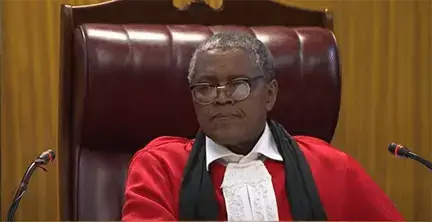The confession audio recording of accused number two in the Senzo Meyiwa murder trial has been ruled inadmissible and excluded as evidence in court.
Judge Ratha Mokgoatlheng ruled on Friday that the making of the recording without the rights in its relation cautioned to the deponent amounts to an infringement of rights.
He said making use of the audio recording as evidence in court would further harm the rights reserved for accused number two, Bongani Ntanzi, throughout the proceedings.
He added that ruling on the admissibility may be reviewed in the trial in light of new evidence that may be brought to the court’s attention.
The ruling comes after the state introduced an audio recording allegedly made by a witness on the stand, magistrate Vivian Cronje.
The state revealed that indeed the accused was not made aware of the audio recording, and had initially indicated that it would not be using the audio.
Prosecution makes sharp U-turn
Advocate George Baloyi later made a U-turn on his decision, highlighting that the audio contains extra details that did not form part of the proforma interview.
However, the defence argued that the audio would further infringe the accused rights, arguing that the confession was made under duress.
Last week, the court engaged in a trial within a trial to assess the admissibility of this potentially crucial evidence.
Section 217 of the Criminal Procedure Act plays a central role in this legal drama, outlining stringent requirements for the admission of confessions as evidence.
Legal expert Lekoko Mateme said last week: “The confession must be proved to have been made freely and voluntarily by such a person in his sound and sober senses and without undue influence.”
Mateme underscored that the burden of proving these requirements beyond a reasonable doubt rests with the prosecution.
If disputed by the accused, they are expected to provide evidence that is reasonably and possibly true.
If the state relies solely on a confession and fails to prove it beyond a reasonable doubt, the matter is finalised in favour of the accused.



